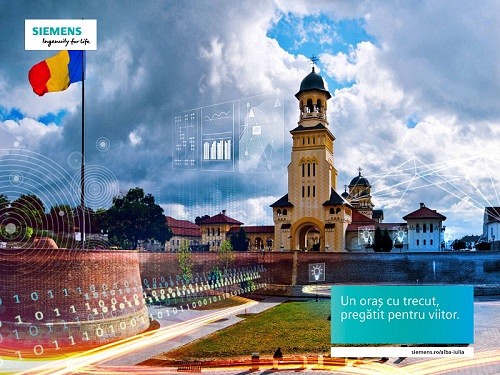Siemens and Alba Iulia Municipality presented on July 13th the results of the Smart Cities Research project. By implementing the technologies showcased in the study, the city could generate – over a period of 35 years – direct and indirect benefits worth 532 million Euros.
The „Smart Cities Research”, initiated by Siemens last year included Alba Iulia, together with other cities such as: Aberdeen and London from Great Britain, Brussels (Belgium) and Kartal (Turkey). In the case of Alba Iulia, the research analyzed three major areas: connectivity, mobility and energy, tracing investment directions, estimating costs and benefits and sketching the following steps to the status of smart city.
„The present offers us the opportunity to build the cities we want to live in with the help of current technologies. By including Alba Iulia in the global Smart Cities Research, we aim to demonstrate the concrete potential on a Romanian city of transforming it into a city of the future, with an interconnected and open structure, which is environmentally friendly and consumes fewer resources. Intelligent technologies help traffic run smoother and leads to a decrease of accidents, can optimize energy consumption and offer more flexibility to industrial consumers. But, above all, they make life easier for each of us, as citizens”, said George Costache, CEO of Siemens in Romania.

According the Siemens Smart Cities Research, in order to implement intelligent technologies in the three priority areas, Alba Iulia would need to invest 227 million Euros, while direct and indirect benefits would rise up to 532 mil. euro, over a period of 35 years.
The research identifies digitalization as the opportunity for Alba Iulia to improve the quality of life of its citizens and increase the city’s attractiveness for tourists, by offering them mobility opportunities in the region.
The study’s main results are presented below:Connectivity. The technologies included in the analysis of the connectivity sector for Alba Iulia and the Alba region are oriented towards improving the tourist experience, increasing the number of visits and the amounts spent by the tourists during their stay, and include: an integrated tourist platform, extended free Wi-Fi, electric bicycle rental services, geolocation and augmented reality beacons and online tickets for public transport.
By integrating information about accommodation, transport and details about events in the city’s tourist app, Alba Iulia can improve the tourist experience and promote a larger number of local businesses, thus increasing the amounts spent in the city and the region. An integrated online ticketing solution can also make tourists’ lives easier, with contactless passes.
Out of the technologies analysed in this respect, the quickest amortisation is expected for the expansion of Wi-Fi coverage and electric bicycle renting. Both elements have positive effects on the tourist experience. A widespread trend in big European cities, electric bicycles are much used by tourists, increasing mobility. They can be fitted with touchscreens that provide information about tourist attractions, restaurants or even city maps. Such a solution exists in Copenhagen.
Mobility.The Siemens research analyses a few other technologies that the city may implement successfully. Operational sensors, which allow collecting infrastructure information and thus create a list of assets and their state, are one of the technologies proposed by the research. This system is more efficient than manual data collection and it brings indirect benefits, such as reducing accidents or decreasing the number of closed roads.
Real-time journey planning, by broadcasting travel options live, and smart parking systems – which inform tourists about the availability of parking spaces – are other technologies with a positive impact on the mobility of tourists and locals alike.
According to the authors of the study, using a system of sensors that would record available parking spaces and then share the information to users on GPS systems or directly on mobile phones through an app, congestion would be reduces and drivers would save 44,000 hours spent in traffic, i.e. the equivalent of €860,000.
Energy. Alba Iulia has undertaken to reduce CO2 emissions by 20% until 2020, and smart technologies are an essential component in achieving this goal.
Investments in an intelligent street lighting control system are, according to the study, the most advantageous as regards short-term efficiency. The research shows that an intelligent lighting system could lead to electricity savings of 14GWh, based on a 73% reduction of the energy consumption for lighting. These savings are the equivalent of the energy demand of 5,000 inhabitants in one year.
In the long term, though, investments in smart electric networks would generate benefits of over €300M. Technologies for renewable energy integration in the power grid of using smart meters could have important benefits.
Further information is available at:
www.siemens.ro/alba-iulia Contact:
Roxana Popescu-Anghel
Tel: 0732 712 531; E-mail: roxana.anghel@siemens.com
